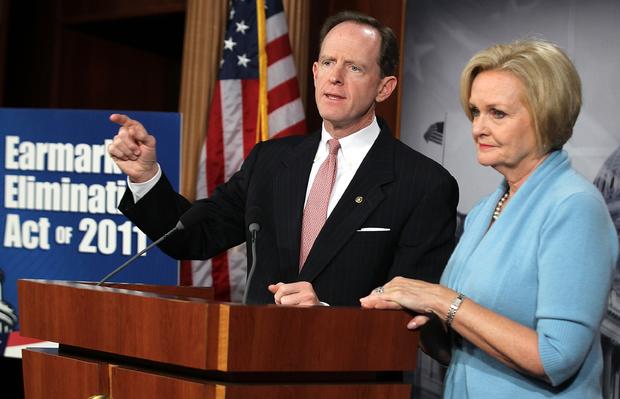Toomey, McCaskill team up to ban earmarks permanently
A pair of bipartisan senators, tired of watching their colleagues get around their promise to stop using earmarks, are introducing legislation to stop congressmen from diverting federal funds for hand-picked local projects.
Leaders in Congress have enacted a temporary, unofficial moratorium on "earmarking," but money for local projects has nevertheless slipped into spending bills.
Sen. Pat Toomey, a Tea Party-backed Republican from Pennsylvania, and Sen. Claire McCaskill, a moderate Democrat from Missouri, today unveiled legislation to make the ban permanent under the letter of the law.
"We can't afford to waste money this way," Toomey said today. "We have staggering deficits, we have completely unsustainable debt."
Toomey pointed out that, over the course of 15 years, earmarking had nearly tripled, reaching nearly $32 billion by 2010. Clearly, $32 billion won't close the budget deficit, Toomey acknowledged. But "we've got to start somewhere, and this is a good place," he said.
"I would argue there is no better place to start," he continued, saying that earmarks were designed for the express purpose of circumventing the competitive bidding process that should be used when allocating taxpayer dollars.
Last year, the Senate rejected a proposed two-year ban on earmarking, but McCaskill said today that it would be difficult for lawmakers to vote against an earmarking ban now, given the current emphasis on deficit reduction and fiscal responsibility.
Voting against the bill she and Toomey are introducing, MsCaskill said, would be the "cherry on top of the dysfunction sundae" that is Congress.
The legislation would allow a lawmaker to challenge anything that looked like an earmark and would require a two-thirds vote of the Senate to get the challenged spending approved.
Lawmakers have gotten around the current earmark moratorium in part by arguing that the funding sliced off for local projects must still go through a competitive bidding process, the Washington Post reports.
For instance, when the House House Armed Services Committee drafted a Defense spending bill this year, committee Chairman Howard "Buck" McKeon, R-Calif., set aside $1 billion for a special fund for member-directed projects -- projects that lawmakers said weren't promised to specific recipients.
McCaskill today referred to that $1 billion fund as a "slush fund," and Toomey called earmarks in general "currency to buy votes." Lawmakers can go to ribbon cuttings at local projects they've funded, he said, and tell voters and donors, "I'm the guy who brought you that big pile of money."
Some members of Congress argue that certain earmarks are legitimately helpful. For instance, the Post reported, Rep. Doris Matsui, D-Calif., this month requested earmarks for a flood-protection project in her district that she said has been publicly vetted.
"I think members of Congress know their districts pretty well and know what they need," Matsui said, according to the Post. "By banning [earmarks] entirely, we are giving all the power to the administration. I don't care if it's a Democrat or a Republican in the White House, they should not have that power."
McCaskill said today that Congress should also ramp up its oversight of the way the executive branch spends money. For instance, last week, McCaskill requested an investigation into a $433 million no-bid contract the Obama administration awarded to the maker of an experimental smallpox vaccine.

